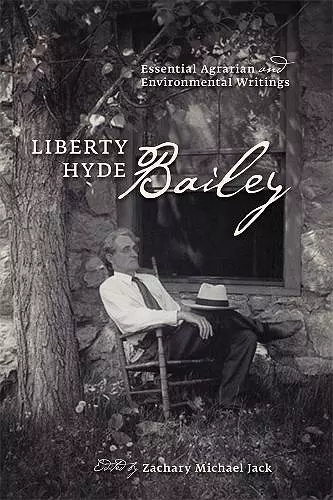Liberty Hyde Bailey
Essential Agrarian and Environmental Writings
Liberty Hyde Bailey author Zachary Michael Jack editor
Format:Paperback
Publisher:Cornell University Press
Published:15th Oct '16
Currently unavailable, and unfortunately no date known when it will be back
This paperback is available in another edition too:
- Hardback£25.99(9780801447099)

"Nature-study not only educates, but it educates nature-ward; and nature is ever our companion, whether we will or no. Even though we are determined to shut ourselves in an office, nature sends her messengers. The light, the dark, the moon, the cloud, the rain, the wind, the falling leaf, the fly, the bouquet, the bird, the cockroach-they are all ours. If one is to be happy, he must be in sympathy with common things. He must live in harmony with his environment. One cannot be happy yonder nor tomorrow: he is happy here and now, or never. Our stock of knowledge of common things should be great. Few of us can travel. We must know the things at home."—from "The Meaning of the Nature-study Movement"
"To feel that one is a useful and cooperating part in nature is to give one kinship, and to open the mind to the great resources and the high enthusiasms. Here arise the fundamental common relations. Here arise also the great emotions and conceptions of sublimity and grandeur, of majesty and awe, the uplift of vast desires—when one contemplates the earth and the universe and desires to take them into the soul and to express oneself in their terms; and here also the responsible practices of life take root."—from The Holy Earth
Before Wendell Berry and Aldo Leopold, there was the horticulturalist and botanist Liberty Hyde Bailey (1858–1954). For Wendell Berry, Bailey was a revelation, a symbol of the nature-minded agrarianism Berry himself popularized. For Aldo Leopold, Bailey offered a model of the scholar-essayist-naturalist. In his revolutionary work of eco-theology, The Holy Earth, Bailey challenged the anthropomorphism—the people-centeredness—of a vulnerable world. A trained scientist writing in the lyrical tradition of Emerson, Burroughs, and Muir, Bailey offered the twentieth century its first exquisitely interdisciplinary biocentric worldview; this Michigan farmer's son defined the intellectual and spiritual foundations of what would become the environmental movement.
For nearly a half century, Bailey dominated matters agricultural, environmental, and scientific in the United States. He worked both to improve the lives of rural folk and to preserve the land from which they earned their livelihood. Along the way, he popularized nature study in U.S. classrooms, lobbied successfully for women's rights on and off the farm, and...
It's strange that Bailey (1858–1954) is not more of a household name. Teacher, botanist, horticulturist, rural sociologist, administrator, encyclopedist, poet, photographer, visionary, Bailey did a lot and wrote even more. Jack's judicious selections and annotations provide readers with a neat digest of Bailey's ideas on education, democracy, agriculture, nature, and community. His theme is essentially agrarian, chiefly a concern for the ills that befall people who are at a distance from the things of the earth. In a style that is at once impressionistic, scientific, and surpassingly poetic, he urges us to pay attention, or, in contemporary parlance, be mindful. His prescience is startling; for example, he wrote in 1911, 'when the new lands have all been opened to cultivation, and when thousands of millions of human beings occupy the earth, the demand for food will constitute a problem which we scarcely apprehend today. We shall then be obliged to develop self-sustaining methods of maintaining the producing power of land.' With a revelation on nearly every page, this collection is highly recommended for all libraries looking to bolster their environmental history collections.
* Library JournISBN: 9781501705670
Dimensions: 229mm x 152mm x 19mm
Weight: 454g
280 pages